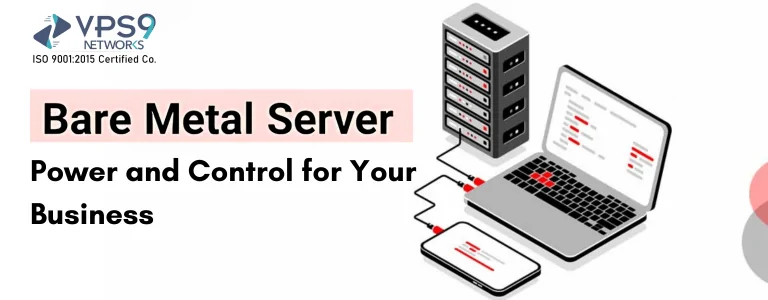
Introduction
In the growing web hosting landscape, the term “bare metal server” is often encountered, especially by businesses looking for efficient, secure hosting solutions. As a leading provider of hosting solutions, VPS9 aims to help users understand the complexities of bare metal servers and so on.
Definition of Bare Metal Server
A bare metal server is a physical server dedicated to a single tenant, unlike a shared or virtualized environment. Virtual servers, which run multiple virtual machines on a single physical server, bare metal servers allocate all their resources—CPU, memory, storage, and network bandwidth—directly to the user This system provides performance, security, and unparalleled capacity for material- intensive applications It is also ideal for resource-intensive applications and enterprises requiring stringent security measures.

Basic characteristics of the bare metal server
- Dedicated resources: All hardware resources are dedicated to a single user, eliminating the performance degradation commonly seen in shared environments.
- Customization: Users have complete control over the server configuration, allowing them to customize it to suit specific needs.
- Increased Performance: With direct access to hardware, bare metal servers offer excellent performance, making them suitable for complex applications such as databases, gaming, large e-commerce platforms
- Enhanced Security: Physically isolated bare metal servers ensure that data is protected from other users, reducing the risk of breaches common in multi-tenant environments
- Scalability: Although traditionally not as flexible as virtual servers, modern bare metal solutions often include scalability options to handle growing workloads.
Benefits of Bare Metal Servers
- Performance and Reliability: By cutting the overhead associated with virtualization, the bare metal server provides maximum processing power and reliability. This is important for applications that require constant processing speed.
- Full control and customization: Users can install whatever operating system, application, and tools they need, and tailor the hardware to their specific needs.
- Enhanced Security: The risk of attack vectors such as hypervisor vulnerabilities is eliminated when there are no shared resources. This makes a bare metal server desirable for handling sensitive data and sensitive applications.
- Predictable costs: Unlike cloud hosting, where costs can fluctuate based on usage, bare metal servers typically come with a fixed monthly or annual fee, providing a manageable budget predict greatly Provide

User Guide for Bare Metal Servers
- Big data and analytics: The processing power and dedicated features of bare metal servers make them ideal for handling big data analytics, ensuring fast and efficient data processing.
- High-traffic websites: E-commerce websites, news sites, and social media sites that get a lot of traffic benefit from the reliability and efficiency of bare metal servers in the 19th century
- Gaming Server: The low latency and high performance of a bare metal server is crucial for a seamless gaming experience.
- Virtualization: Companies can run their virtualized environments on bare metal servers, enabling the flexibility of virtual machines running dedicated hardware
- Mission-critical applications: Applications that require high availability, strong security and guaranteed performance, such as financial services and healthcare systems, are best served by bare metal servers.

Selecting the Right Bare Metal Server
There are several factors to consider when choosing a bare metal server to ensure it meets your specific needs:
- Hardware Specification: Review CPU, RAM, storage type, and network capacity. Higher-end processors, more memory, and SSD storage are often required for complex applications.
- Bandwidth and Connectivity: Make sure the server provides enough bandwidth and network speed to meet your anticipated traffic and data transfer needs.
- Support and services: Consider the level of support and service services provided by the provider. Administrators can assist with server installation, maintenance, and troubleshooting.
- Scalability Options: Determine if the provider offers scalable solutions that can grow with your business needs.
- Cost: Compare pricing models and make sure there are no hidden costs. Fixed pricing can help with good budgeting.
Conclusion
Bare metal servers represent the pinnacle of performance, control and security in the hosting world. As businesses demand more robust and reliable hosting solutions, it’s important to understand the benefits of bare metal servers and how to use them properly. VPS9 is committed to providing high-quality bare metal server solutions tailored to our customers’ needs. By choosing a bare metal server, companies can ensure the smooth, secure and efficient running of their critical applications, paving the way for growth and success in a digital-first world.

